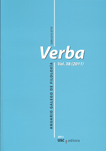Métodos para medir la riqueza léxica de los textos. Revisión y propuesta
Contenido principal del artículo
Resumen
Palabras clave:
Detalles del artículo
Referencias
Baayen, R. H. & Tweedie, F. J. (1998): "How variables may a constant be? Measures in lexical richness in perspective", Computers and the Humanities 32, pp. 323-352. https://doi.org/10.1023/A:1001749303137
Baayen, R. H. (2001): Word frequency distributions. Dordrecht: Kluver Academic Publishers. https://doi.org/10.1007/978-94-010-0844-0
Baayen, R. H. (2008): Analyzing Linguistic Data. A Practical Introduction to Statistics Using R. Cambridge: Cambridge University Press. https://doi.org/10.1017/CBO9780511801686
Bowker, L & Pearson, J. (2002): Working with specialized language. A practical guide to using corpora. London / New York: Routledge. https://doi.org/10.4324/9780203469255
Carroll, J. B. (1964): Language and Thought. New Jersey: Prentice-Hall, Englewood Cliffs.
CICA = Torruella, J & Pérez Saldanya, M. & Martines, J. (dirs.) (2013): Corpus Informatitzat del Català Antic. http://www.cica.cat [última consulta: 30/01/2016].
Covington, M. A. & McFall, J. D. (2010): "Cutting the Gordian Knot: The Moving-Average Type–Token Ratio (MATTR)", Journal of Quantitative Linguistics 17/2, pp. 94-100. https://doi.org/10.1080/09296171003643098
Dugast, D. (1978): "Sur quoi se fonde la notion d’etendue theoretique du vocabulaire?", Le Francais Moderne 46, pp. 25-32.
Ferrando, A. (ed.) (2007): Curial e Güelfa. Edició a cura de –. Tolouse: Anacharsis.
Guiraud, P. (1960): Problèmes et Méthodes de la Statistique Linguistique. Dordrecht: D. Reidel.
Harris Wright, H. & Silverman, S. W. & Newhoff, M. (2003): "Measures of lexical diversity in aphasia", Aphasiology 17, pp. 443-452. https://doi.org/10.1080/02687030344000166
Hauf, A. (ed.) (2005): Joanot Martorell. Tirant lo Blanch. València: Tirant lo Blanch.
Herdan, G. (1955): "A new derivation and interpretation of Yule's 'Characteristic' K", Zeitschrift für angewandte Mathematik und Physik 6/4, pp. 332-339. https://doi.org/10.1007/BF01587632
Herdan, G. (1960): Quantitative Linguistics. London: Butterworth.
Honoré, A. (1979): "Some Measures of Richness of Vocabulary", ALLC Bulletin 7/2, pp. 172-177.
Jarvis, S. (2002): "Short texts, best-fitting curves and new measures of lexical diversity", Language Testing 19, pp. 57-84. https://doi.org/10.1191/0265532202lt220oa
Johnson, W. (1944): "Studies in language behavior: I. A program of research", Psychological Monographs 56, pp. 1-15. https://doi.org/10.1037/h0093508
Maas, H. D. (1972): "Zusammenhang zwischen Wortschatzumfang und L'ange eines Textes", Zeitschrift für Literaturwissenschaft und Linguistik 8, pp. 73-79.
McKee, G. & Malvern, D. & Richards, B. (2000): "Measuring vocabulary diversity using dedicated software", Literary and Linguistic Computing 15/3, pp. 323-337. https://doi.org/10.1093/llc/15.3.323
Malvern, D. D. (1989): Thetype-token characteristic - an empirical investigation of a mathematical model for thetype-token ratio. Reading: University of Reading, Faculty of Education and Community Studies. Unpublished working paper.
Malvern, D. D. & Richards, B. J. (1997): "A new measure of lexical diversity", in A. Ryan & A. Wray (eds.): Evolving Models of Language. Clevedon: Multilingual Matters, pp. 58-71.
Malvern, D. et alii (2004): Lexical Diversity and Language Development. Quantification and Assessment. New York: Palgrave Macmillan.
McCarthy, P. M. (2005): "An Assessment of the Range and Usefulness of Lexical Diversity Measures and the Potential of the Measure of Textual, Lexical Diversity (MTLD)", Dissertation Abstracts International 66/12, UMI No. 3199485.
McCarthy, P. M. & Jarvis, S. (2007): "Vocd: A theoretical and empirical evaluation", Language Testing 24/4, pp. 459-488. https://doi.org/10.1177/0265532207080767
McCarthy, P. M. & Jarvis, S. (2010): "MTLD, vocd-D, and HD-D: A validation study of sophisticated approaches to lexical diversity assessment", Behavior Research Methods 42, pp. 381-392. https://doi.org/10.3758/BRM.42.2.381
Miller, J. F. (1991): "Quantifying productive Language disorders", in J. F. Miller (ed.): Research on child language disorders: a decade of progress. Austin: Pro-Ed, pp. 211-220.
Muller, C. (1968): Initiation à la statistique linguistique. Paris: Librairie Larousse.
Orlov, J. & Chitashvili, R. (1983): "Generalized Z-distribution generating the well-known rank-distributions", Bulletin of the Academy of Sciences 110, pp. 269-272.
Riera i Sans, J. (ed.) (1976): Llibre de Job. Versió del segle XVI. Edició a cura de –. Barcelona: Insititut d'Estudis Catalans.
Rojo, G. (2002): "Sobre la Lingüística basada en el análisis de corpus". Ponencia plenaria en las Jornadas sobre corpus lingüísticos (organizadas por Uzei, San Sebastián, octubre de 2002).
Rojo, G. (2008): "Lingüística de corpus y lingüística del español". Ponencia plenaria en el XV Congreso de la Asociación de Lingüística y Filología de América Latina (Montevideo, 18-21 de agosto de 2008). Disponible en: http://gramatica.usc.es/~grojo/Publicaciones/Lgca_corpus_lgca_espanol.pdf.
Sichel, H. S. (1975): "On a distribution law for word frequencies", Journal of the American Statististical Association 70/351, pp. 542-547. https://doi.org/10.1080/01621459.1975.10482469
https://doi.org/10.2307/2285930
Sichel, H. S. (1986): "Word frequency distributions and type-token characteristics", Mathematical Scientist 11, pp. 45-72.
Somers, H. H. (1966): "Statistical methods in literary analysis", in J. Leeds. (ed.): The computer and literary style. Kent: Kent State University, pp. 128-140.
Templin, M. C. (1957): Certain languages kills in children: Their development and interrelation ships. Westport: Greenwood.
Tres, J. (ed.) (1995): Francesc Comte. Il·lustracions dels comtats de Rosselló, Cerdanya y Conflent. Barcelona: Curial.
Van Gijsel, S. & Speelman, D. & Geeraerts, D. (2005): "A Variationist, Corpus Linguistic Analysis of Lexical Richness", in Proceedings from the Corpus Linguistics Conference Series, vol. 1/1, pp. 1-16. http://www.birmingham.ac.uk/research/activity/corpus/ publications/conference-archives/2005-conf-e-journal.aspx.
Yule, G. U. (1944): The Statistical Study of Literary Vocabulary. London/Cambridge: Cambridge University Press. Zipf, G. K. (1949): Human Behavior and the Principle of Least Effort. Cambridge/ Massachusetts: Addison-Wesley.






